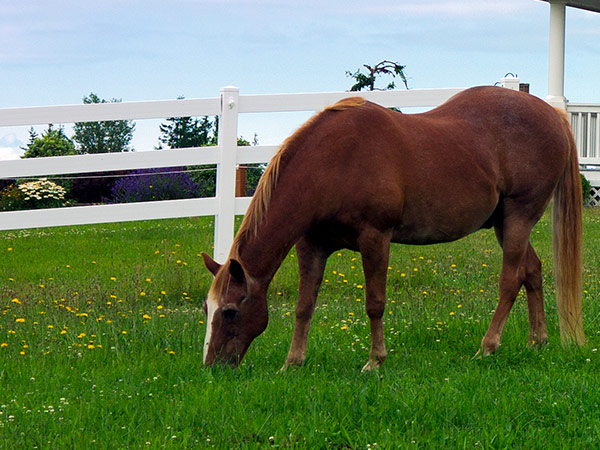

Ranch Fencing That Fits Your Needs
As any rancher knows, a good fence is vital in any operation, small or large. Good fencing helps keeps animals safe and predators out, denotes boundary lines, and helps to control grazing. However, there are many ranch fencing types to choose from depending on your animals and the other demands of your ranch. Before investing in a new fence, determine which one will best suit your needs for a secure pen or field so you can avoid chasing those runaways!
Ranch Fencing Options
- Post with wire is your basic field fence. T-posts can be used with 14-gage spool wire, barbed wire, electric wire, and welded wire. Most fencing wires are galvanized to prevent rust. T-post fencing with wire is generally cost-effective and easy to install. Wooden fence posts can also be used with most types of wire and are typically made from treated lumber to resist insects.
- Electric wire adds security to an existing t-post, panel, or split rail fence or can be used by itself. This wire has an electric current that flows through the fencing with the use of a fence controller connected to a power source. These fences require some special equipment including a low voltage alert and a cut out switch. If you decide on this type of fence, be sure you will be able to keep a consistent current going, otherwise it just becomes a wire fence. Electric wire is also easy to use as temporary fencing to control grazing.
- Barbed wire can also be added to various types of fencing like t-post and panels. Each wire has 2- or 4-point barbs running down the length of the wire. While a single wire can be added to a fence, most barbed wire fencing uses standard 3-5 strands or suspension fencing that uses 4-6 strands. Suspension fencing can also be used with smooth wire and allows the fence wire to move if your animal gets stuck. For a more ridged fence, stays can be added in-between your posts. Other wire that can be used is a thick cable wire for durability.
- Welded wire fence panels are for tighter control pens. These wire panels have horizontal and vertical wires that create a mesh pattern. Some are made specifically for hogs or cattle with high-tensile strength wire, for horses with a horse-safe knot, and for goats with smaller openings. They can be used with wood posts or t-posts.
- Split rail fencing is a popular choice for denoting a boundary line and to add a classic look to your property. These fences are made from wood, vinyl, or even galvanized tubing and have three to four horizontal beams supported between posts. Wire mesh fencing can be added to the boards if you have smaller animals like chickens.
- Gates provide easy in and out for you while keeping your animals secure. Just remember to close the gate! Most gates are made with a strong, but lightweight galvanized tubing. Gates can be hand operated or motorized with remote-control openers depending on how permanent your fence will be and other considerations. Security systems can be added such as padlocks, keypads, and even security cameras.
- Cattle guards are metal grates installed in the ground and are usually added along the fence line where roads are. They allow vehicles to travel over them while deterring cattle from crossing through and onto a roadway. Depending on where your cattle guard is placed, you may not even need a gate. A gate can be added if you are wanting added security for your property, but the cattle guard will do its job of containing livestock in your fenced area.

Fencing for Your Animals

Any animal can bust through the wrong fence easily injuring themselves in the process. Different animals require different fencing needs keeping in mind that needs might change overtime.
- Cattle: Your cattle fence will need to be a minimum of 46 inches high with a high-tensile strength wire. Barbed wire or electric fencing is commonly used with cattle. A cattle guard would be a great option if your fence has an opening near a roadway as cattle tend to wander. Split rail fencing or cattle panels can be used, but it is best to run an electric wire to keep them away from the fence line.
- Sheep and Goats: These fences are shorter than cattle fences and require smaller open spaces along the fence line. Woven wire fence panels made specifically for sheep and goats will keep them from getting their heads caught in the fence and provides strong predator control. It is usually best to not use barbed wire when keeping sheep as their wool can easily get caught in the barbs.
- Horses: Bottom line, horses need to be able to see the fence. Split rail fences provide easy visibility and just looks nice. Woven wire horse fencing panels are also popular as they have horse-safe knots with smaller openings to help prevent your curious or sometimes excited horse from putting a hoof through the paneling. As these are also high-tensile, they will not break easily. As with sheep, don’t use barbed wire with horses as they can hurt themselves.
- Pigs: Pig fences need to be close to the ground to prevent rooting and they don’t need to be very tall. They can also be installed as an apron-style fence where the bottom portion is bent into the pen area to prevent the animal from getting under the fence. Hog paneling or any high-tensile fencing will be able to withstand a strong pig. A strand of electric wire can be added close to the ground to keep your pigs away. Panels can be good temporary fencing if you are using your pigs to help churn your soil as they can be easily moved.
McCoy's Farm and Ranch Outfitters
McCoy’s makes it easy to get the materials you need to build your preferred fence. Whether you have a few goats or a large cattle operation, easily shop online or in-store today. If you need help or have any questions, contact our Farm and Ranch Specialist, Cliff Mulanax, for all your fencing needs, all things Priefert, and more!

Reviewed by Cliff Mulanax
McCoy's In-House Expert

